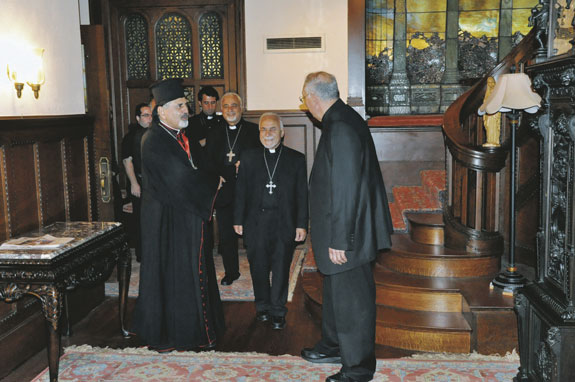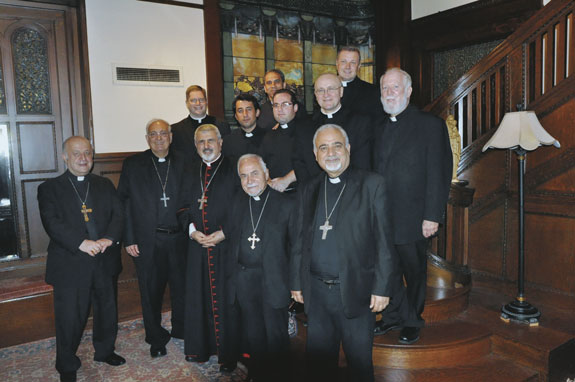My dear brothers and sisters in the Lord,

Last week, I received visits from several bishops from Lebanon, Syria, Iraq and Nigeria. During these visits, it became more clear that the presence of Christians in the Middle East and Africa is threatened now in a way that has never happened. The success of ISIS (the Islamic State of Iraq and Syria) is one that truly foretells the fate of Christians in the Middle East.
Recently, it was reported, and was confirmed by the bishops who visited me, that the Islamist extremists give three options to Christians whom they encounter in the lands that they have conquered: one, convert to Islam; two, pay a tax which seems impossible to pay; or three, leave. There is a fourth option, however, which is to stay and face the sword. Truly, it is disappointing that the civilized world has abandoned these Christian minorities in the places where Christianity flourished before Islam even was a thought. That is the situation in the world today, however.
The first bishop to visit was Bishop Elias Sleman, a Maronite Bishop of the Eparchy of Latakia, which covers the middle portion of Syria, and who also serves as pastor for the Marionites in that particular area. This area has many Christians. In fact, there is a place called the Valley of Christians, where the presence of Christians has been constant for many centuries. Unfortunately, according to Bishop Sleman, it may soon be empty. He outlined three major challenges and concerns.
He says, “First, we are a people who were never used to beg, nor do we want to become beggars. Second, the Syrian people are moderate and hospitable, they do not know extremism, radicalism, or fanaticism; and it is very true to describe them with the words of the new saint, John Paul II, about Lebanon, ‘Lebanon is more than a country, Lebanon is a message;’ and third, our land is so precious in history, it is the land that witnessed many civilizations and was nourished by them in affection and fidelity.”
It seems that the equilibrium of the past has now become completely overturned. Although Syria in certain areas has returned to an uneasy peace, it is now facing the latest challenges of expelling the Islamic extremists from its land.
When speaking about the political situation, all the bishops told me that they see it as an unfortunate reality that only dictatorship seems to bring relative peace in the Middle East. Democracy, as it is known in the West, is not yet comprehensible to the peoples who live in that region.
The second visit was from an old friend, His Beatitude, Patriarch Ignatius Joseph III Younan, whom I first met in the Archdiocese of Newark, N.J., in the early 1980s. He became Bishop of the Syrian Diocese in the U.S. and is now the Patriarch of the Syrian Rite Catholics throughout the world. He was accompanied by the Syrian Archbishop of Bagdad, Archbishop Yousif Abba, and his Patriarchal Vicar, Bishop Georges Qasmousa, as well as the present Bishop of the Syriac Catholic Diocese of the U.S., Bishop Yousif Habash. It was truly heartrending to listen to their stories. The perspective they brought came from being pastors in a very troubled land.
When asked about the root causes of the difficulties today, their point of view is not easy for us Westerners to understand. They point the finger at Saudi Arabia and Qatar as the countries fermenting the unrest with the philosophy of Wahhabism but also who have the petrol dollars to fund radicalism. Our U.S. government, for many administrations, has seen the Saudis as allies in bringing tranquility into the Middle East. It seems, however, that this may have been a mistaken alliance, at least from the point of view of those who live in that region.
The other surprising, and perhaps shocking, fact is that Middle Eastern Christians and Muslims no longer look to the U.S. for moral support. They have turned their sights towards the East and to Russia, which seems to have been the only country, from their point of view, that has come to their rescue and tried to eliminate the radicalism. This is difficult for us to understand, especially after what we have just experienced with the Russian-incited violent separatism in Ukraine. But the world is complicated, and the politics of today demand careful analysis before any conclusions can be drawn.
In speaking with Patriarch Younan, who recently returned from visiting Northern Iraq trying to console the refugees from Mosul and other Christian villages surrounding it, the threat from ISIS seems to be taken more than seriously. Entire towns have been abandoned, and the people have moved to a neighboring region known as Kurdistan, which is adjacent to parts of Iran, Iraq, Syria and Turkey. The Christians seem to be welcomed by the Kurds, at least with basic hospitality. It is difficult to know when these refugees might return or how they would sink new roots in another land under Kurdish domination.
The Kurds also seek their division of Northern Iraq. It seems, in fact, that the division of Iraq has already occurred with ISIS in the center, the Kurds in the North and the Iraqi government controlling Baghdad and the South. The caliphate established by the Islamist radicalists will, in my opinion, grow if not stopped or hindered from growing at this time. They have captured valuable oil fields and banks, thereby gaining control of resources necessary for their reign of terror.
Each of the bishops who visited with me has one message: “Try to influence your government to do something to aid our people.” Unfortunately, they have difficulty defining what the “something” is, short of unraveling long-term alliances, which perhaps now make no sense. The request for even aid to the refugees is not high on their priorities. It is clear to them and to anyone that understands the situation that the presence of Christians in the Middle East has a dim future. Without major intervention, the Christians will not survive in their present conditions.

Lebanon has always been the refugees to the Christians in the Middle East. And, yet, that country, with its delicate balance between Muslims and Christians, may not be able to accept more refugees and resettle them. There are not too many options left, as they desperately want to keep the Christian presence in the Middle East and these historic Christian settlements. It is not clear, however, how this could happen.
Patriarch Younan was going to continue his travels to Washington, D.C. to meet with various Congresspersons who might be sympathetic to the situation to bring this issue before the Congress. It is unfortunate that the complexity of the situation is hardly understood by our government. As a result, little is being done to assist persons with resettlement or with help in placing those displaced.
Allow me to end with one heartrending story encountered in a letter sent to me by Archbishop Samir Nassar of the Maronites in Damascus who speaks about Father Franz Van Der Lugt, a 75-year old Dutch Jesuit living in Syrian since 1972. For all of those years, he worked to help disabled persons, both Christian and Muslims, in finding a place to live. The story was carried in news outlets when the extremists overran Homs. Father Franz was martyred on April 7 of this year. In his letter, Archbishop Nassar says, “There was no priest to celebrate his funeral. Father Franz was buried in the courtyard of the convent. He was buried by a small number of Muslim and Christian refugees who form a community of ‘cloistered’ life, living with scarcity and in fear.”
This is the situation that, unfortunately, is aided and abetted by the misunderstanding of our own government, baffled by the complexity of the Middle East where it seems that we have either done little or sided with the wrong people.
Before the week ended, I had a surprise visit from Archbishop Ignatius Ayau Kaigama, accompanied by his friend Msgr. John Brown, pastor of St. Thomas Aquinas parish, Flatlands. He came from the Archdiocese of Jos in Nigeria, in which the 200 girls were kidnapped by Boko Haram. The Archbishop also serves as the President of the Nigerian Catholic Bishops Conference. Archbishop Kaigama has worked for many years trying to foster dialogue between Christians and Muslims which has been successful. But Boko Haram is desperately targeting both moderate Muslims and Christians with their reign of terror. The Archbishop has written a book entitled, “Peace, Not War,” documenting 10 years of dialogue between Christians and Muslims.
The Christians of the Middle East and some African nations truly have put out into the deep, and it is not clear if they will ever find a safe shore. They have been propelled into the chaotic situation by Islamist extremism. Our own communication outlets, The Tablet and NET-TV, have tried to report news about the present plight of Christians in the Middle East and Africa to bring the attention to their plight. It seems that we are isolated in this attempt. A call to your federal representatives explaining your concern might be helpful.
I was able to assist these visiting bishops from our own diocesan mission collection with aid to assist the many refugees and displaced person who come to them daily seeking the assistance of the Church. I offer some simple thanks to the people of Brooklyn and Queens who gave of themselves during this collection and are helping those in the Middle East and Africa.



i do not get how one can be a Muslim and willingly threaten people who aren’t islamic. People of the Islamic faith aren’t supposed to try and convert people to their ways but threatening people to do so is technically the same thing. I just don’t get it.